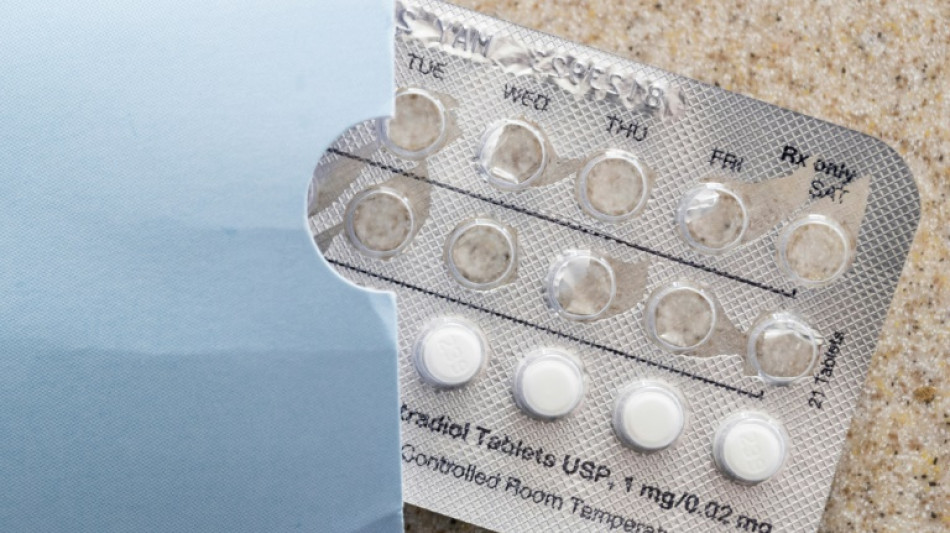
-
 Munich's surfers stunned after famed river wave vanishes
Munich's surfers stunned after famed river wave vanishes
-
Iran commemorates storming of US embassy with missile replicas, fake coffins

-
 Gauff sweeps Paolini aside to revitalise WTA Finals defence
Gauff sweeps Paolini aside to revitalise WTA Finals defence
-
Shein vows to cooperate with France in probe over childlike sex dolls

-
 Young leftist Mamdani on track to win NY vote, shaking up US politics
Young leftist Mamdani on track to win NY vote, shaking up US politics
-
US government shutdown ties record for longest in history

-
 King Tut's collection displayed for first time at Egypt's grand museum
King Tut's collection displayed for first time at Egypt's grand museum
-
Typhoon flooding kills over 40, strands thousands in central Philippines

-
 Trent mural defaced ahead of Liverpool return
Trent mural defaced ahead of Liverpool return
-
Sabalenka to face Kyrgios in 'Battle of Sexes' on December 28

-
 Experts call for global panel to tackle 'inequality crisis'
Experts call for global panel to tackle 'inequality crisis'
-
Backed by Brussels, Zelensky urges Orban to drop veto on EU bid

-
 After ECHR ruling, Turkey opposition urges pro-Kurd leader's release
After ECHR ruling, Turkey opposition urges pro-Kurd leader's release
-
UK far-right activist Robinson cleared of terror offence over phone access

-
 World on track to dangerous warming as emissions hit record high: UN
World on track to dangerous warming as emissions hit record high: UN
-
Nvidia, Deutsche Telekom unveil 1-bn-euro AI industrial hub

-
 Which record? Haaland warns he can get even better
Which record? Haaland warns he can get even better
-
Football star David Beckham hails knighthood as 'proudest moment'

-
 Laurent Mauvignier wins France's top literary award for family saga
Laurent Mauvignier wins France's top literary award for family saga
-
Indian Sikh pilgrims enter Pakistan, first major crossing since May conflict

-
 Former US vice president Dick Cheney dies at 84
Former US vice president Dick Cheney dies at 84
-
Fiorentina sack Pioli after winless start in Serie A

-
 Oscar-winning Palestinian films daily 'Israeli impunity' in West Bank
Oscar-winning Palestinian films daily 'Israeli impunity' in West Bank
-
Spain's Telefonica shares drop on dividend cut, net loss

-
 Fierce mountain storms kill nine in Nepal
Fierce mountain storms kill nine in Nepal
-
Divisive Czech cardinal Dominik Duka dies at 82

-
 Shein vows to cooperate with France in sex doll probe
Shein vows to cooperate with France in sex doll probe
-
EU in last-ditch push to seal climate targets before COP30

-
 Finnish ex-PM Marin says her female cabinet faced torrent of sexism
Finnish ex-PM Marin says her female cabinet faced torrent of sexism
-
Sudan army-backed council to meet on US truce proposal: govt source

-
 BP profit surges despite lower oil prices
BP profit surges despite lower oil prices
-
Shein vows to cooperate with France in childlike sex doll probe

-
 National hero proposal for Indonesia's Suharto sparks backlash
National hero proposal for Indonesia's Suharto sparks backlash
-
Indian great Ashwin out of Australia's BBL after knee surgery

-
 Indian Sikh pilgrims enter Pakistan, first major crossing since May conflict: AFP
Indian Sikh pilgrims enter Pakistan, first major crossing since May conflict: AFP
-
Asian markets slip as traders eye tech rally, US rate outlook

-
 Nintendo hikes Switch 2 annual unit sales target
Nintendo hikes Switch 2 annual unit sales target
-
Typhoon flooding kills 5, strands thousands in central Philippines

-
 Jobe Bellingham finding his feet as Dortmund head to City
Jobe Bellingham finding his feet as Dortmund head to City
-
US civil trial to hear opening arguments on Boeing MAX crash

-
 Jamie Melham on Half Yours only second woman to win Melbourne Cup
Jamie Melham on Half Yours only second woman to win Melbourne Cup
-
Myanmar scam hub sweep triggers fraudster recruitment rush

-
 Biggest emitter, record renewables: China's climate scorecard
Biggest emitter, record renewables: China's climate scorecard
-
Floods strand people on roofs as typhoon pounds Philippines

-
 Asian markets swing as trades eye tech rally, US rate outlook
Asian markets swing as trades eye tech rally, US rate outlook
-
South Korea to triple AI spending, boost defence budget

-
 Trott to leave as Afghanistan coach after T20 World Cup
Trott to leave as Afghanistan coach after T20 World Cup
-
Late queen's fashion to go on show at Buckingham Palace

-
 In Morocco, exiled Afghan women footballers find hope on the pitch
In Morocco, exiled Afghan women footballers find hope on the pitch
-
EU scrambles to seal climate deal ahead of COP30


Attacking birth control pills, US influencers push misinformation
US wellness influencers are increasingly targeting birth control pills, pushing their followers to abandon the contraceptives with false claims about infertility and low libido that researchers say leave them vulnerable to unintended pregnancies.
The explosion of misinformation on platforms such as TikTok and Instagram comes as reproductive rights take center stage in the looming presidential election, in a country where abortion is banned or restricted in nearly half the states.
Many influencers -- who are not licensed medical specialists -- are part of what appears to be a cottage industry of self-proclaimed health gurus monetizing misinformation as they hawk "healing" oils and fertility-tracking services.
People seeking reliable information about contraception are met with internet personalities overemphasizing the side effects of pills.
That includes Taylor Gossett, a TikTok influencer with nearly 200,000 followers who explicitly called the medication "toxic" alongside offers to join her "master class" in "natural" birth control.
Conservative commentator Candace Owens suggested on TikTok that birth control causes infertility problems, while "life coach" Naftali Moses told his 280,000 followers that it "changes your sexual behavior."
Podcaster Sahara Rose called birth control the "divorce pill" in a video viewed more than 550,000 times, claiming it impacts who "you're attracted to" and leads users to choose the wrong mate.
The pill's effect on libido has been debated for decades, with some women complaining of impacts on their sex drive.
But while some women may experience such side effects, medical experts say individual experiences do not represent widespread causal links.
Experts also say there is no direct causal evidence that birth control pills lead to widespread infertility or altered attraction and sexual behavior.
- 'More fear' –
"Misinformation can dissuade people from using birth control that could help them with contraception," Michael A. Belmonte, a fellow at the American College of Obstetricians and Gynecologists, told AFP.
"Most concerning in this political landscape we have in the US currently is that birth control misinformation may lead to people becoming pregnant... and now (they) may not have access to abortion."
Belmonte said he had personally treated patients who became pregnant after avoiding contraception because of the "harmful misinformation" they had heard or seen online.
The rise in misleading videos compounds what researchers see as a worsening state of reproductive health care following the US Supreme Court's decision to overturn the nationwide right to abortion 2022.
The landmark ruling paved the way for 21 states to introduce total or partial bans on abortion.
"This spike in contraception misinformation correlates with the restriction of abortion access in a number of states," misinformation researcher Jenna Sherman told AFP, adding that many of the online falsehoods stemmed from "anti-abortion actors."
"People are in greater need of guidance around reproductive health decisions and have more fear around speaking to a health care provider," she said.
- 'Shame, stigma' -
Many influencers recommend fertility awareness-based methods (FAMs) –- in which the menstrual cycle and body temperature are carefully tracked, to help users time sex to avoid their fertility window.
But experts say it is far less effective than medical birth control, with the Centers for Disease Control and Prevention (CDC) putting the failure rate at up to 23 percent -- and resulting in unwanted pregnancies.
A slew of female influencers also make the case for getting off birth control to lose weight -- despite a lack of direct medical evidence linking pills to weight gain -- often with dramatic before and after videos.
"It's likely contributing to further shame, stigma, and distorted body images," said Sherman.
Birth control pills are deemed safe and effective by health experts, but like many other medications can cause some adverse outcomes -- most commonly nausea, headaches and bleeding between periods.
In rare instances, they can also lead to blood clots and strokes. The Food and Drug Administration says the risk of clots can affect three to nine women out of 10,000 who take the pill.
Many of these side effects can be mitigated by switching to another type of birth control or waiting for the symptoms to subside, health experts say -- distinctions seldom provided by influencers who, chasing clicks and followers, often exaggerate the negatives.
"People don't realize that many of these influencers have their own financial incentives for pushing false or misleading narratives that also don't prioritize the health of the people they're targeting," Sherman said.
Making the decision to abandon birth control "should be made with legitimate health information and the help of a care provider, not an influencer," Sherman added.
burs-ac/nro
A.Ruegg--VB




